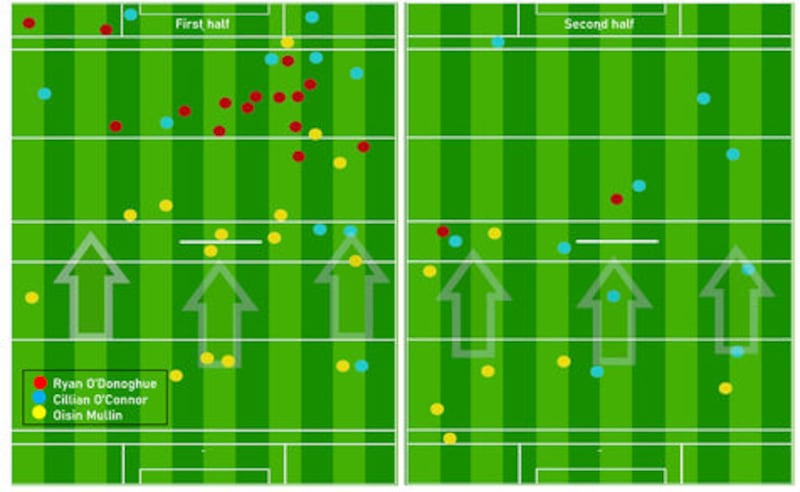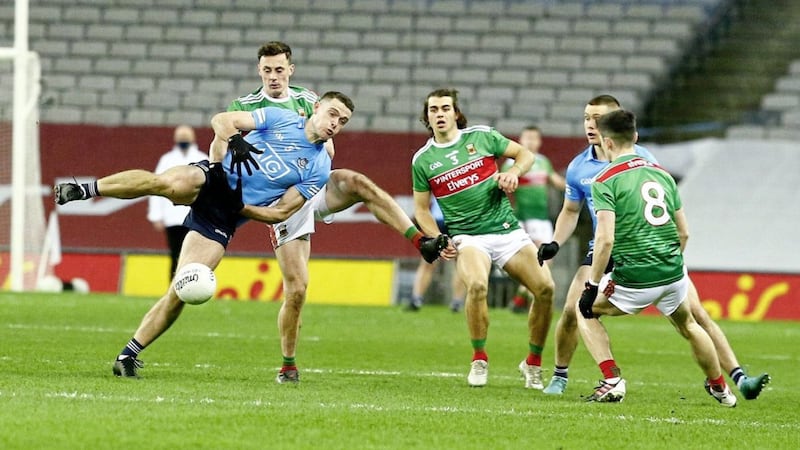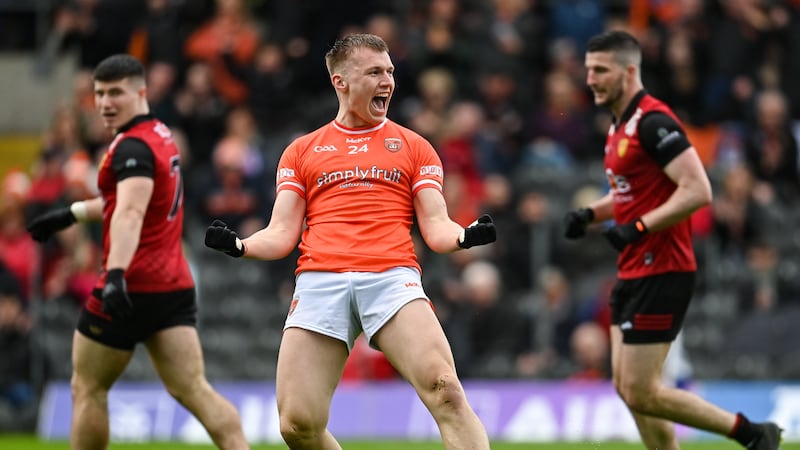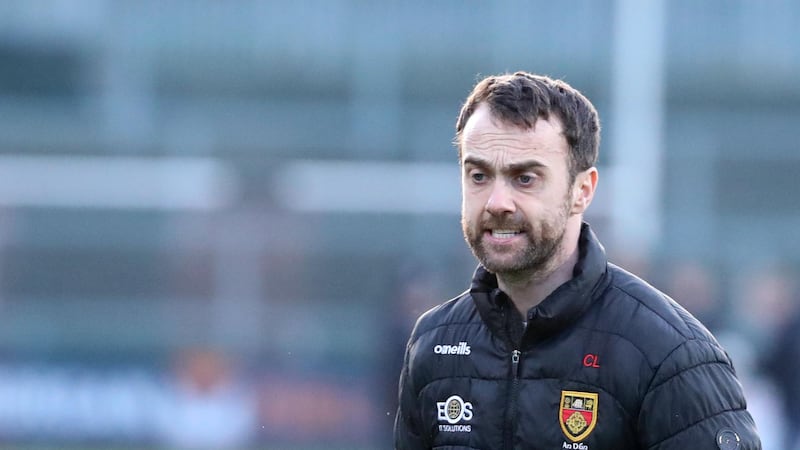All-Ireland SFC final: Dublin 2-14 Mayo 0-15
DUBLIN don’t do romance, so let’s not go down that road.
Six years in a row Stephen Cluxton has climbed the 15 short steps to the presentation area. There was no tickertape, there were no tears, no handover of the trophy. Lift it off the plinth, show it to the world, speak and move on.
The pandemic championship has felt surreal, unusual and out-of-place yet for those few post-match moments on Saturday, it felt perfect. Emotionless, clinical, cold, Croke Park was everything that Dublin are.
That is no criticism, because it is in removing the emotion from games that Dublin have found the way to win All-Irelands.
For generations they danced to the tune of Hill 16, playing the darling boys act, and it was only when Pat Gilroy steeled their focus and shut off the outside world that the tide began to turn.
You’d forgive them for thinking how easy this would be if the Hill was never filled again.
For as much as Mayo would have felt aided by the lack of hype, they could have done with the crowd at stages. There were times in the first half when you could almost hear the excitement from the far side of the country, but it was in the final 20 minutes that they most needed to be lifted and carried by the wave of their kinsmen and women.
Dublin didn’t play well in the first half because, as usual, Mayo didn’t allow them to play well. The fastest goal in All-Ireland history after 12 seconds was wiped out within two-and-a-half minutes. Cillian O’Connor’s salute on the equaliser let us know that these were no impostors in Mayo jerseys. They brought the same that all Mayo teams bring.
For a while that was chaos and energy and pace. And for a while it troubled Dublin.
But to know why Dublin are All-Ireland champions again, you must examine a few complex, yet simple, turnarounds.
Look particularly at what they did in the second half to Mayo’s three key players from the first half.
Cillian O’Connor, Ryan O’Donoghue and Oisin Mullin had run the westerners’ attacking game.
O’Connor had two points from play, two marks and three pointed frees. O’Donoghue had two points and two assists. Mullin had a point and won three kickouts.
They had 40 possessions between them in the opening 35 minutes. Of the 40, just six were inside their own 65’ and five of those belonged to Mullin, who was basically playing at centre-back.

In the second half, he didn’t touch the ball inside Dublin’s 65’ and got his hands on it just seven times in total.
Having scored from four of seven touches inside Dublin’s 45’, O’Connor didn’t score from play in the second period. He touched leather just twice in that same zone and only eight times in total.
The most significant impact was on O’Donoghue. Every one of his 15 first half possessions were within 50 metres of the Dublin goal, the majority in the centre-half-forward area. He had a huge impact as their link man.
In the second half, he touched the ball just twice in the 23 minutes he played before being withdrawn, and neither of them were anywhere near Dublin’s 45.
So what did Dublin do that affected it? The first thing was moving Eoin Murchan on to O’Donoghue. The same low centre of gravity, he was able to cover every dodge and twist the Belmullet man tried. It completely nullified him.
Nothing complex there, and nothing really that Dessie Farrell had done wrong given that most would have identified Tommy Conroy as the greater threat coming into the game, which was where Murchan began.
Dublin also pushed Con O’Callaghan closer to goal for longer spells in the second half. While he still dipped out around the middle, he had a greater impact out there than a tiring Mullin had.
Farrell knew that Mayo couldn’t afford to let O’Callaghan go in without sending Mullin with him. And with Paddy Durcan off injured, all of a sudden the Connacht champions’ punch from half-back completely disappeared.
Anything they were trying to run they were having to do it from the full-back line. Eoghan McLaughlin didn’t get into the game and with the concern that Dublin could prise them open for goal if they left themselves bare at any stage, Mayo’s running game carried very little threat in the second half.
O’Connor’s lack of impact was down to the shifts that happened nowhere near him. Brian Howard coming into midfield and Brian Fenton significantly stepping up his game allowed Dublin to dictate the whole second half.
They won a far greater degree of primary possession, winning 75 per cent of their own kickouts compared to 50 per cent in the first half. They also took 29 per cent of David Clarke’s ball away, and that gave them the platform.
When they earned the ball, they kept it. When they won the throw-in while down to fourteen men, they kept the ball for two minutes and 28 seconds before they lost it. Nine times in the second half they worked the ball for over a minute, six of them over 90 seconds, whereas Mayo broke the 60-second barrier just five times.
Those are just the numbers that reflect how the game felt to the naked eye. Dublin played it at the pace they wanted it to be played at.
They’d recognised where the Mayo threat was coming from and took steps to nullify it. For that, in his first All-Ireland final under the pressure not to be the man that lost it, Dessie Farrell did a largely excellent job.
James Horan got so much right himself. The match-ups worked well, the way they created 3v2s on their own kickouts and grew into dominant figures on so many of Cluxton’s, so much of it was right.
But the margins are so small that the third quarter felt like a loss. Having had so much joy from pushing man-to-man for 35 minutes, they stepped off when they had an extra body on the field. It looked like a mistake at the time, and it proved to be one.
That’s what Dublin do to you. Like Peter Keane last year, you can get 95 per cent of it right but they will find out what the other 5 per cent is and they’ll hammer it.
It may be repetitive and boring and almost like an anesthesia to the senses, but it’s so impressive nonetheless.
The day it ends is no closer and no further away. Dublin go in a straight line and the others wobble up and down beneath it, a good year here, a bad one there.
An All-Ireland series that had contained two of Kerry, Donegal or Tyrone would have asked more questions but such was 2020. We cannot complain, for any football was better than none.
There is very little left to say about them.
All the swirling debates around Dublin can sit still for a day or two. There has to be time given to appreciate them too, for no matter what has been behind it, they are the greatest bunch of footballers the sport has ever seen.
MATCH STATS
Dublin: S Cluxton; M Fitzsimons, J Cooper, E Murchan; D Byrne, J Small (0-1), R McDaid; B Fenton (0-1), J McCarthy; N Scully (0-1), C O’Callaghan (1-1), S Bugler (0-1); P Small, C Kilkenny (0-3), D Rock (1-4, 0-4 frees)
Subs: B Howard for Bugler (HT), P Mannion for P Small (50), C Basquel for Cooper (53), C Costello for Scully (70), P McMahon for Murchan (74)
Mayo: D Clarke; C Barrett, P Durcan, L Keegan; S Coen (0-1 mark), O Mullin (0-1), E McLaughlin; D O’Connor, M Ruane; K McLoughlin, R O’Donoghue (0-2), C Loftus (0-1); T Conroy, A O’Shea, C O’Connor (0-9, 0-2 marks, 0-5 frees)
Subs: M Plunkett for Durcan (HT), J Carr for Conroy (49), D Coen (0-1) for O’Donoghue (57), J Flynn for Loftus (61), J Durcan for Mullin (71)
Referee: D Coldrick (Meath)








